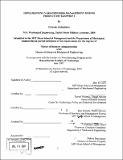Implementing variation risk management during product development
Author(s)
Padgalskas, Nicholas (Nicholas Keith)
DownloadFull printable version (5.980Mb)
Other Contributors
Leaders for Manufacturing Program.
Advisor
Daniel Whitney and Roy Welsch.
Terms of use
Metadata
Show full item recordAbstract
All manufactured systems exhibit some degree of variation. Manufacturing organizations should be aware of those parameters whose variation will impact product performance and customer satisfaction. Such parameters are called Key Characteristics. Their variation plays a large part in the success of manufacturing programs; planning for too little variation can lead to low production yields, while planning for too much variation can lead to over-design. The chance for low yields or over-design is referred to as variation risk. Although most companies realize the importance of understanding variation, many still have difficulty implementing variation risk management programs. For some the challenge lies in changing the organizational culture to operate in a concurrent engineering environment that implements variation risk management. For others who are ready to make the change, the challenge is more technical in nature: even if Key Characteristics can be identified, their variation may not be known, especially if used in a new product whose sub-systems have never been through the production line. (cont.) This thesis addresses the challenges of variation risk management encountered during an internship at Raytheon Company, and presents a unique solution for overcoming a lack of information regarding Key Characteristic variability. Once information is obtained, analysis is conducted to assist with identifying trade-offs and making program-level decisions. Although many problems presented are unique to Raytheon Company, the concepts can be applied across a wide range of manufacturing industries.
Description
Thesis (M.B.A.)--Massachusetts Institute of Technology, Sloan School of Management; and, (S.M.)--Massachusetts Institute of Technology, Dept. of Mechanical Engineering; in conjunction with the Leaders for Manufacturing Program at MIT, 2007. Includes bibliographical references (p. 67-69).
Date issued
2007Department
Leaders for Manufacturing Program at MIT; Massachusetts Institute of Technology. Department of Mechanical Engineering; Sloan School of ManagementPublisher
Massachusetts Institute of Technology
Keywords
Sloan School of Management., Mechanical Engineering., Leaders for Manufacturing Program.